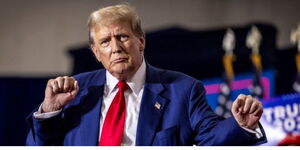Kenyans working in the United States under the H-1B visa program are at risk of losing their jobs after US President Donald Trump ordered companies to pay a mandatory processing fee of $100,000 (Ksh12.9 million) to facilitate the employment of foreign workers.
In the executive order, foreign workers, including Kenyans who may have left the US temporarily, would not be able to return unless their employers pay the mandatory fee. This would effectively lock them out of the US.
The order, which will come into effect from September 21, will affect Kenyans who are currently working in the US, as they will not be able to leave the country without a guarantee of their employers paying the fee when they head back.
Aside from paying the mandatory processing fee, companies would be required to pay the same amount of $100,000 (Ksh12.9 million) annually from the time of registration.
About the H-1B Visa Program
The H-1B is a classification of non-immigrant visa in the United States that allows US employers to hire foreign workers in specialty occupations. It is regulated and implemented by the United States Citizenship and Immigration Services (USCIS), a department within the Department of Homeland Security.
H-1B visa status holders typically have an initial three-year stay in the US. They are entitled to a maximum of six years of physical presence in H-1B status. After reaching certain milestones in the green card process, H-1B status can be extended beyond the six-year maximum.
Jobs under the H-1B program include IT and Computer Science, Engineering, Healthcare, Medical Professions, Finance, Business, and Management. Other professions affected are Education and Research, Architecture and Design, and other specialised fields such as Law, Economics, Media and Communications, Statistics, and Psychology.
However, not every job qualifies. For a role to be eligible, it must be considered a “specialty occupation” by USCIS, meaning it normally requires highly specialized knowledge and at least a bachelor’s degree in a related field.
Kenyans working in IT and Computer Science, Consulting and Outsourcing, Engineering, Healthcare, Finance and Banking, Architecture, Education and Research, and Manufacturing are most likely to be affected, as they are the sectors with high H-1B sponsorship.
Details About Trump's H-1B Executive Order
The order required employers to retain documentation of payment remittance, with the Secretary of State verifying payment during the petition process and the Departments of State and Homeland Security denying entry for non-payment.
Also, it requires the Departments of Labour and Homeland Security to issue joint guidance for verification, enforcement, audits, and penalties.
While issuing the order, Trump noted that the move was done with the aim of prioritising American workers. He added that imposing higher costs on companies seeking to use the H-1B program would address the abuse of the program, stop the undercutting of wages, and protect national security.
Even so, critics have argued that the move would be detrimental to critical sectors such as health care, higher education, and technology, which highly depend on foreign employees.
Current statistics reveal that there are approximately 700,000 H-1B visa holders in the US, with another 550,000 listed as dependents of these workers.












